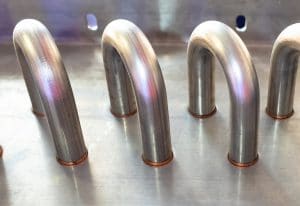 These days, there are many different types of electrical cooling systems for companies and technology designers to choose from. The most frequently implemented solutions tend to be advanced heat exchangers that are able to handle varying levels of thermal management needs with optimal efficiency. For example, heat pipe heat exchangers, which are one of the most common types of heat exchangers, can be designed to keep large-scale equipment as efficiently cooled as smaller, high-performance electronics, and much more. In many cases, heat pipes can be the most beneficial choice in electrical cooling systems, and increasingly more technologies are benefiting from their high-performance cooling capabilities.
These days, there are many different types of electrical cooling systems for companies and technology designers to choose from. The most frequently implemented solutions tend to be advanced heat exchangers that are able to handle varying levels of thermal management needs with optimal efficiency. For example, heat pipe heat exchangers, which are one of the most common types of heat exchangers, can be designed to keep large-scale equipment as efficiently cooled as smaller, high-performance electronics, and much more. In many cases, heat pipes can be the most beneficial choice in electrical cooling systems, and increasingly more technologies are benefiting from their high-performance cooling capabilities.
What is a heat pipe heat exchanger?
All heat exchangers are designed to transfer electrical waste at rapid paces in order to prevent electrical overheating. Within a heat pipe, this process occurs with the help of an eco-friendly cooling fluid that circulates through the pipes. The fluid absorbs the heat that electrical components give off, then transfers it through the pipes to a heat sink or other depository where it can release the heat it has collected. Transferring heat is made more efficient with the help of natural processes such as natural/forced convection and conduction. Also, heat pipes can be designed to bend and curve as necessary to fit comfortably in tight spaces.
The benefits heat pipes can bring companies
The heat transfer process that modern heat exchangers rely on make them inherently beneficial in streamlining electrical thermal management. More conventional cooling solutions relied more heavily on the use of chilled or condensed air to combat waste heat and stop it from causing damage. While effective, these methods can take large amounts of energy to keep running, and the accompanying equipment could be costly to maintain. By contrast, heat pipes can keep waste heat flowing in a continuous loop away from sensitive components, helping companies save significant amounts of energy and time while also improving their electrical cooling efficiencies.
Do heat pipes work for all applications?
The great thing about heat pipes is that they can be customized to meet the unique needs of increasingly more advanced applications, as well as those of long-standing technologies. Their adaptability makes them another significant asset to modern companies; the more applications they can outfit with modern heat pipe assemblies, the greater the benefits they can gain from them. However, heat pipes may not always be the optimal cooling solution, which is why companies increasingly rely on a wider variety of heat exchanger types.
For more information about heat pipes used as efficient electrical cooling systems, call Noren Thermal Solutions in Taylor, TX, at 866-936-6736.







